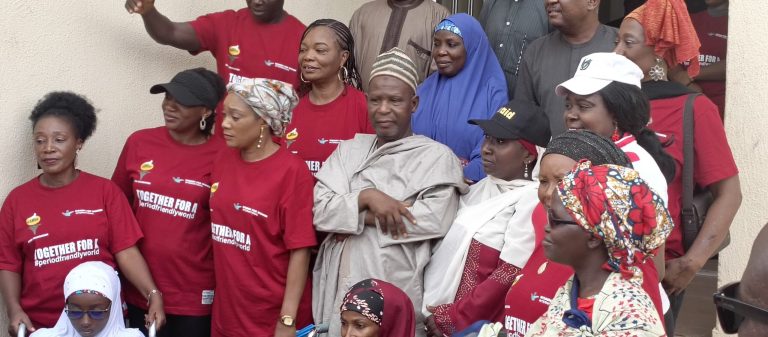Bauchi State Commissioner of Women Affairs and Child Development, Hajara Gidado has described menstrual Hygiene as an important aspect of the growth and development of the Girl-child.
The commissioner was speaking on Tuesday when a coalition of CSOs and NGOs led by Attah Sisters Helping Hands (ASHH) Foundation paid an advocacy visit to the Ministry as part of activities marking the 2024 International Menstrual Hygiene Day Celebration with the theme: “Together for a #Periodfriendly World”.
Represented by the Permanent Secretary of the Ministry, Saleh Abfulmumimi the Commissioner assured that the Ministry is ready to give every support needed to make life comfortable for the Girl-child.
Hajara Gidado assured that considering the critical nature of menstrual Hygiene to the girl child, her Ministry will support CSOs, NGOs, and other relevant children and women-related agencies for the good of the child.
She then promised to carefully go through the document presented to her to see how the Ministry can come in to support the move and make menstrual Hygiene priority.
The Coalition in the document described menstruation as a natural and essential part of life, yet it remains a topic considered taboo in many cultures and societies.
The Coalition stressed that silence and stigma surrounding menstruation have led to a lack of access to proper menstrual hygiene facilities, products, and education affecting women and girls. It’s time to break the silence and advocate for menstrual hygiene and dignity.
According to the Coalition, research findings regarding the State of Menstrual Hygiene indicate that 500 million women and girls worldwide lack access to menstrual products and facilities
Also, 1 in 10 girls in Africa miss school due to lack of menstrual products, 70% of women and girls in India use unhygienic materials during menstruation while Menstrual hygiene-related infections and illnesses are a significant public health
It then expressed concern that the Consequences of Poor Menstrual Hygiene include, Health complications: Infections, toxic shock syndrome, and reproductive health issues, and Education and economic empowerment: Girls miss school, and women miss work leading to reduced economic opportunities.
Another concern is Social and cultural stigma: Menstruation is often seen as shameful or impure perpetuating harmful gender stereotypes as well as lack of access to menstrual products and facilities which is violation of the rights of women and adolescents to health, education, and dignity.
The Coalition of NGOs, CBOs, and Stakeholders working to support improving Menstrua Hygiene practices and access funded by Women for Women International was established by Attah Sisters Helping Hand Foundation (ASHHF) alongside Child is Gold Foundation.
It also includes Alwadata Lifeline Initiative, The Kairo Initiative, CARD Initiative, SWOFON, NIWOREN, WOWICAN, LANGA, AIDCODE, Rotary Club Bauchi Central, National Youths Service Corps, Heart That Truly Cares NAGARI WOWEN FARMERS, CAN, GNI, NACTAL, AIYON, Wowen with Disabilities Intergrerty Developmental Initiative, Doctors Wife Association.
The Network commenced its women and girls Justice Project Tagged: “Advocacy Project on Un-Tax Menstrual Pad”.
